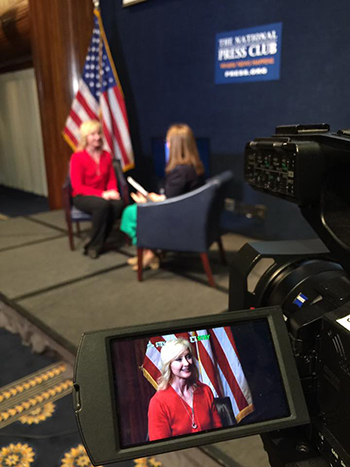By Alex Quade
TAMPA, Fla. — Admiral William McRaven doesn’t know what the future holds for Special Operations forces in Afghanistan, but he knows it’s going to be challenging.
The commander of U.S. Special Operations Command struck a hopeful tone recently, saying that the relationship with Afghan and coalition partners is “fabulous.”
“Frankly, I think the relationship is as strong as I have ever seen it,” McRaven explained, “and part of it is I think the Afghans recognize that there are difficult times ahead. And they appreciate the partnership they’ve had with the U.S. and with the broader coalition.”
“You know, we’re not naïve to the challenges in Afghanistan; the Afghans are not naïve to the challenges in Afghanistan,” McRaven said. “As long as we continue to partner, as long as we continue to talk, you know, we’re going to collectively move forward in the right direction.”
To maintain that partnership, President Barack Obama is banking on a Bilateral Security Agreement with the Afghans which would keep some American troops in the country past 2014. Both of the candidates currently running to replace Afghan President Hamid Karzai have publicly stated their support for a BSA.
“We are obviously drawing down right now in Afghanistan, even in the Special Operations arena we are drawing down,” McRaven said. “I don’t know what those final numbers will look like. Whatever they look like, if there are SOF forces left in there, we will continue to partner at the appropriate level with our Afghan partners.”
“Does that mean at the tactical level? It may not mean at the tactical level, it may mean at the, you know, corps level or ministerial level,” McRaven suggested.
“Again, it remains to be seen based on some of the decisions between the two governments,” he added.
Maj. Gen. Mike Nagata is the commander of Special Operations Command Central, which counts Afghanistan in its area of responsibility.
Nagata said that the U.S. withdrawal is becoming more “vivid” to the Afghan National Security Forces, who realize the window for U.S. support is closing rapidly.
“They recognize that the opportunity to ask for our help — whether it’s training or equipping — is finite,” Nagata explained. “And at some places and at some times, they are coming up and asking for our help because they know that opportunity is dwindling.”
It’s “[n]ot that we don’t intend to keep a force there to assist them,” Nagata said, “but the scale of it is obviously getting much smaller, so the opportunity window is currently shrinking.”
The rush to pull out of Afghanistan has left decisions about what to leave behind a bit murky, Nagata revealed.
“As we’re pulling stuff and materiel and equipment and hardware out of Afghanistan, some things that we might have otherwise wanted to provide the Afghan National Security Forces will simply not be available unless we’re willing to return it to Afghanistan,” he said. “Now I wish I could tell you that in the monumental effort to get everything out of Afghanistan, we can perfectly anticipate what we need to leave behind for every tactical eventuality, but the reality is we’re not that smart and we’re not that good.”
Whatever the future holds, Special Operations units have drawn important lessons over the last dozen years of war fighting.
The commander of Joint Special Operations Command — under which falls elite units like SEAL Team 6 and Delta Force — Lt. Gen. Joseph Votel said that Afghanistan and Iraq have been the places where his men have refined their “process.”
“Over the last 12 or 13 years of operations, we have developed a process by how we actually affect our operations,” Votel said, “our targeting methodologies and such. Known as kind of the ‘find, fix, finish, exploit, analyze’ process: a way of looking at a problem and applying resources against it to come up with solutions, and then use those solutions and what comes out of that — those particular operations — to kind of continue to drive operational tempo that allows us to achieve the desired end state.”
One of those “desired end states,” for example, was the capture or killing of Osama bin Laden — led then by McRaven, Votel’s predecessor.
“The challenge before us is how do we take that great methodology we refined over the last 12 or 13 years, and apply it to areas outside of declared theaters of active armed conflict,” Votel explained.
Votel’s focus for JSOC’s top-tier missions, he said, will continue to be precision — minimizing collateral damage and the impacts on the surrounding environment.
“Certainly that is always a very, very important aspect for us, whether we’re operating in Afghanistan or anyplace else,” Votel said. “But I would suggest to you that it becomes more important when we’re operating in areas outside of declared combat zones.”
Meanwhile, Air Force Special Operations Commander Lt. Gen. Eric Fiel stated that his Air Commandos are still “out there every single day,” whether it’s doing intelligence, surveillance and reconnaissance, mobility or strike missions.
“We did a lot of JTAC training [directing close air support from behind enemy lines], Special Tactics, for the last 13 years because that’s what was required in Afghanistan,” Fiel said. He added that his Special Operations Combat Controllers are now in other global locations doing things like landing zone surveys.
“They’re all over the continent of Africa looking at runways. And the PJs” — short for Pararescue Jumpers — “are getting back to their thing, and same thing with the weather guys,” Fiel said.
“Everything’s, everybody’s been going to Afghanistan,” said Fiel. “So it’s time to re-set, go look in your kit bag again.”





